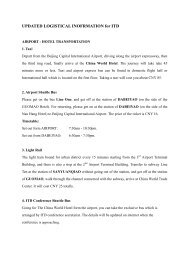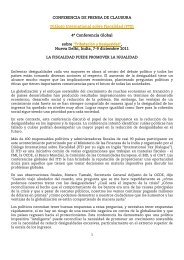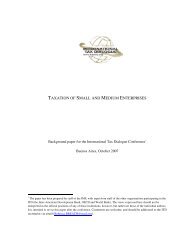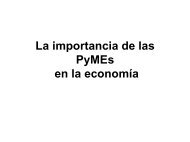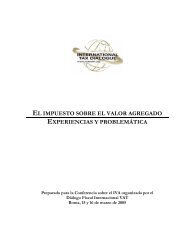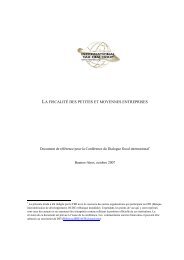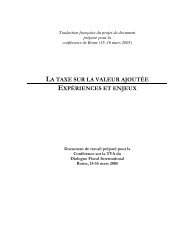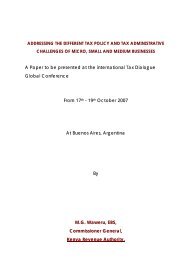Arcotia Hatsidimitris - International Tax Dialogue
Arcotia Hatsidimitris - International Tax Dialogue
Arcotia Hatsidimitris - International Tax Dialogue
You also want an ePaper? Increase the reach of your titles
YUMPU automatically turns print PDFs into web optimized ePapers that Google loves.
44 – 5. MAINTAINING PROGRESS, TACKLING DELAY<br />
Box 8. Example – the South African Revenue Service (SARS)<br />
SARS has recently placed much greater emphasis on face to face negotiation and intensive<br />
discussion of difficult issues. This is proving to be effective and producing settlements, even in one<br />
case where the result involved a degree of double taxation for the taxpayer. All transfer pricing<br />
audits are done by the 12-member transfer pricing team.<br />
Where a clear timetable for the enquiry has been set or agreed, any deviation from that should be<br />
signalled in advance and any necessary changes to the timetable made clear. If the case is subject to<br />
an internal process within the tax administration that may take some time, this should be explained to<br />
the business and they should be kept informed about progress. Similarly, the business should be asked<br />
to be open about progress in dealing with any requests for information or documents that are taking<br />
some time to collate.<br />
Some tax administrations are increasingly looking to develop enhanced relationships with their<br />
large business customers. For example, in the Netherlands this is known as horizontal monitoring,<br />
which was piloted in the very large business segment and is now a well established programme that<br />
has been extended to other customer groups. <strong>Tax</strong>payers who are willing to take part in the programme<br />
and whose profile is suitable enter into a formal agreement with the Netherlands <strong>Tax</strong> and Customs<br />
Administration. An important element is the existence or establishment of a tax control framework<br />
which ensures early knowledge about tax risks; in large cases the tax control framework will<br />
encompass transfer pricing issues. Horizontal monitoring is based on three key values: mutual trust,<br />
understanding and transparency. Transparency means that there is complete openness between the<br />
taxpayers and the tax administration. The taxpayer is transparent about their tax strategy and the<br />
relevant tax issues, including transfer pricing issues. Filed tax returns do not adopt standpoints on<br />
material issues that have not been discussed with the tax administration in advance. This approach<br />
enables discussion about difficult issues, including transfer pricing risks, up front and much closer to<br />
the time when the transactions are executed, that is to say in ‘real time’.<br />
Role of advisors<br />
Whilst some tax administrations felt that the involvement of advisors could, at times, hinder<br />
engagement with business and therefore slow down the progress of a transfer pricing case, others<br />
recognised the positive role that advisers could play in facilitating engagement and dialogue between<br />
business and the tax administrations. A number of tax administrations gave examples of where<br />
advisers had been constructive in persuading business to take a more reasonable view of the tax<br />
administrations’ contentions.<br />
One novel example of how advisors had supported positive engagement and facilitated progress<br />
was provided by the UK.<br />
DEALING EFFECTIVELY WITH THE CHALLENGES OF TRANSFER PRICING © OECD 2012





